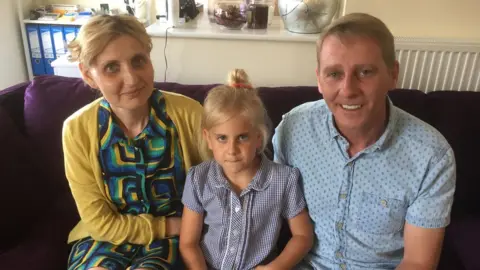Haverfordwest mum's 'roadblocks' to SIRT cancer treatment
NHS Wales has been accused of "not being set up to deal with" certain types of cancer.
Anca Falconer, 36, from Pembrokeshire, was diagnosed with Leiomyosarcoma (LMS), a type of soft tissue sarcoma, just days after giving birth in 2010.
Her request for specialist treatment in England was refused.
The Welsh Health Specialised Services Committee said the success of Selective Internal Radiation Therapy (SIRT) "has not currently been established."
Mrs Falconer, who lives in Haverfordwest, initially underwent extensive surgery and chemotherapy for her rare liver cancer, but it returned.
Her first request to the committee was rejected in 2013 on funding grounds, and her cancer consultant refused to submit another application, describing the efforts as being "futile", and she was told she would have to find the money herself.
Fundraising efforts allowed her to receive the first round of SIRT, which involves injecting radioactive microbeads into the liver, at a cost of £10,000.
Mrs Falconer, who had been bedbound for about three months, said she felt transformed after the treatment.

"Within days I was able to stand up again. I can play with Mary and take her to school," she said. "I had lost hope before."
The second round of treatment costs £20,000 and is due by late August.
Mrs Falconer's husband, Richard, 51, said NHS Wales was "not set up to deal with soft tissue sarcomas" with many of the specialist centres in England.
He added that he thought experts in Wales had "given up on his wife" four years ago and that she had received "nothing more than palliative care" and "roadblocks to all curative options that should have been on the table".
Dr Sian Lewis, medical director for the Welsh Health Specialised Services Committee, said the "clinical effectiveness" of SIRT for the treatment of liver cancer "has not currently been established".
She said it is only available to a limited number of patients in NHS England as part of a programme to assess its effectiveness.
The Welsh Government said NHS Wales will make a decision regarding the routine commissioning of SIRT when the results of the evaluation become available next year.
False hopes
Abertawe Bro Morgannwg University Health Board, which provided chemotherapy to Mrs Falconer, said if previous funding requests have been declined by the committee any subsequent submission has to contain "new clinical evidence".
A statement from the health board said, while it could not comment on Mrs Falconer's case, its "clinicians fully appreciate the distressing situation its patients are in".
"It's because of this they would never consider falsely getting a patient's hopes up by resubmitting an already declined request when there is no new clinical evidence available."
Hywel Dda University Health Board has also been asked to comment.